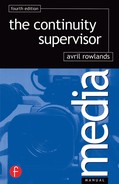Working on Documentary-Type Productions: 1
You Will Always Know Something
Even if you are working on a production that appears to be totally unscripted and unplanned, you will always know something before you arrive on location – even if it is only the subject matter.
If, for example, you know nothing more than that you are working on a documentary about drink, then at least you can begin to focus your attention somewhere. Anything liquid, in bottles, restaurants, homes, on tables, in shops, should attract your interest.
Continuity
The job of continuity will, of necessity, be less precise than on scripted productions, but all the points in earlier chapters should be taken into consideration:
Shot Description
An accurate and full shot description is of first importance. It is not enough to note simply ‘Close-up large machine’ without finding out and stating what the object is. This is especially important when the subject matter is of a technical nature. Neither is it sufficient to note ‘Close-up of manometer’ without giving a description. The editor is extremely unlikely to know what a manometer is and the director may well have forgotten.
Names and Addresses
Always note down the names, addresses and titles of those taking part, e.g. Chairman of Blogswich Cricket Club, 1951, taking care to ensure that the spelling is accurate. Your note on your shot list may end up on a graphic on the completed programme.
Locations
Always note the location in your shot description. To state:
‘W/A mountain
W/A different mountain
GV group of mountains’
is not that helpful to the editor, the director or the person writing the commentary.
‘If you’re working on a documentary about drink … the job of continuity will, of necessity, be less precise.’

